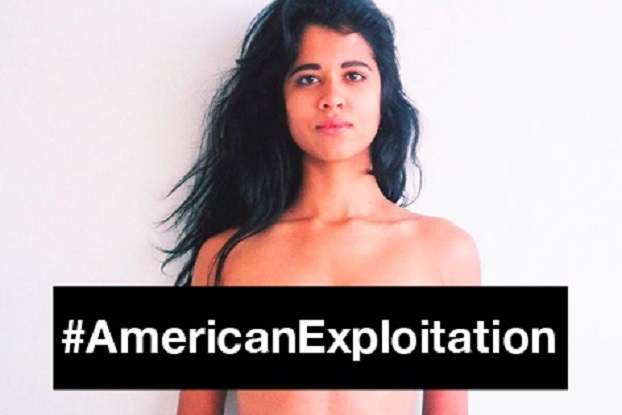It should come as no surprise that American Apparel is once again the target of social criticism. The retailer is known for its controversial advertisements featuring naked models and even a sixty year-old model. Their most recent ad features a topless Asian-American woman — a merchandiser named Maks, who has been working with American Apparel since 2010 — wearing only a pair of high-waisted jeans, with the words “Made in Bangladesh” stamped across her chest.
The ad has produced mixed reviews via social media. Some publications have deemed it as “pretty cool,” and a visual way for American Apparel to point out that it treats all of its garment workers fairly, especially when compared to factories in Bangladesh.
“The labor issue is something we’ve spoken out about for a long time,”says creative director Iris Alonzo on the inspiration behind the ad. “In addition to physically unsafe conditions, Bangladesh has some of the lowest paid garment workers in the world. The recently increased monthly wage is still only $68 USD per month. American Apparel’s nearly 5,000 industrial workers in Los Angeles are earning from $10- $25 per hour. It is important for consumers to think about the people that we don’t see when looking at fashion photography.”
Yet for others, the ad represents another instance of the objectification of women of color, and, specifically, it gives more power to large corporations. L.A. activist Tanzila “Taz” Ahmed wrote an open letter to Maks via South Asian magazine “The Aerogram” yesterday as a fellow Bangladeshi to discuss the “fine line between self-expressive and being exotified and commodified.”
[wp_ad_camp_1]
“The implication is that Bangladesh is bad, and American is good,” Ahmed writes in regards to the ad’s deeper message. “Burka-ed Muslim women are bad, and bare-breasted “former” Muslims with newly found American freedoms are good. Right?”
Ahmed cites the garment factories in Bangladesh as being built from the ground up on the backs of Bangladeshi women, and the same factories have collapsed or caught on fire in recent years, claiming these womens’ lives.
“Boycotting Bangladesh made products means we’re boycotting the Deshi-made women that helped get us here – our Ammas and Khalas and Chachis. Amadher bhon, our sisters. We just want to make sure they are safe and can survive.”
[wp_ad_camp_2]







